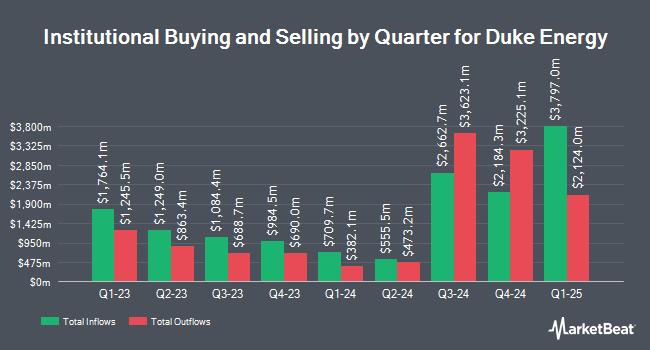National Bank of Canada FI lifted its stake in Duke Energy Corporation (NYSE:DUK - Free Report) by 76.7% in the first quarter, according to its most recent disclosure with the Securities and Exchange Commission (SEC). The institutional investor owned 713,970 shares of the utilities provider's stock after purchasing an additional 309,928 shares during the quarter. National Bank of Canada FI owned 0.09% of Duke Energy worth $87,081,000 as of its most recent filing with the Securities and Exchange Commission (SEC).
A number of other hedge funds have also made changes to their positions in DUK. Vermillion Wealth Management Inc. bought a new position in Duke Energy during the fourth quarter valued at approximately $27,000. Wayfinding Financial LLC bought a new position in Duke Energy during the first quarter valued at approximately $27,000. N.E.W. Advisory Services LLC bought a new position in Duke Energy during the first quarter valued at approximately $27,000. Mattson Financial Services LLC bought a new position in Duke Energy during the fourth quarter valued at approximately $28,000. Finally, Redwood Park Advisors LLC bought a new position in Duke Energy during the fourth quarter valued at approximately $36,000. 65.31% of the stock is owned by hedge funds and other institutional investors.
Analyst Ratings Changes
Several equities analysts recently weighed in on the stock. UBS Group reaffirmed a "neutral" rating and set a $127.00 price objective (up previously from $124.00) on shares of Duke Energy in a research report on Friday, July 11th. Citigroup raised their price objective on shares of Duke Energy from $130.00 to $142.00 and gave the company a "buy" rating in a research report on Wednesday, May 7th. BMO Capital Markets increased their price target on Duke Energy from $131.00 to $132.00 and gave the company an "outperform" rating in a report on Wednesday. The Goldman Sachs Group set a $132.00 price target on Duke Energy in a report on Tuesday, July 1st. Finally, Barclays lowered their price target on Duke Energy from $123.00 to $122.00 and set an "overweight" rating on the stock in a report on Tuesday, July 1st. Seven investment analysts have rated the stock with a hold rating and nine have given a buy rating to the stock. According to data from MarketBeat, the stock has a consensus rating of "Moderate Buy" and an average target price of $129.20.
View Our Latest Research Report on DUK
Duke Energy Stock Performance
Shares of Duke Energy stock traded down $0.57 during midday trading on Friday, hitting $125.36. The company had a trading volume of 2,643,623 shares, compared to its average volume of 3,240,884. The business's 50 day simple moving average is $118.24 and its two-hundred day simple moving average is $117.59. The stock has a market cap of $97.48 billion, a PE ratio of 20.38, a P/E/G ratio of 3.02 and a beta of 0.36. The company has a debt-to-equity ratio of 1.55, a current ratio of 0.66 and a quick ratio of 0.42. Duke Energy Corporation has a 1-year low of $105.20 and a 1-year high of $127.85.
Duke Energy (NYSE:DUK - Get Free Report) last announced its quarterly earnings data on Tuesday, August 5th. The utilities provider reported $1.25 earnings per share (EPS) for the quarter, missing the consensus estimate of $1.29 by ($0.04). The company had revenue of $7.51 billion during the quarter, compared to analyst estimates of $7.07 billion. Duke Energy had a return on equity of 9.85% and a net margin of 15.51%. The company's revenue was up 4.7% on a year-over-year basis. During the same quarter in the previous year, the business posted $1.18 EPS. As a group, equities analysts predict that Duke Energy Corporation will post 6.33 EPS for the current fiscal year.
Duke Energy Increases Dividend
The company also recently announced a quarterly dividend, which will be paid on Tuesday, September 16th. Investors of record on Friday, August 15th will be given a $1.065 dividend. This represents a $4.26 annualized dividend and a yield of 3.4%. This is an increase from Duke Energy's previous quarterly dividend of $1.05. The ex-dividend date of this dividend is Friday, August 15th. Duke Energy's dividend payout ratio (DPR) is 67.97%.
Duke Energy Company Profile
(
Free Report)
Duke Energy Corporation, together with its subsidiaries, operates as an energy company in the United States. It operates through two segments: Electric Utilities and Infrastructure (EU&I), and Gas Utilities and Infrastructure (GU&I). The EU&I segment generates, transmits, distributes, and sells electricity in the Carolinas, Florida, and the Midwest.
Further Reading

Before you consider Duke Energy, you'll want to hear this.
MarketBeat keeps track of Wall Street's top-rated and best performing research analysts and the stocks they recommend to their clients on a daily basis. MarketBeat has identified the five stocks that top analysts are quietly whispering to their clients to buy now before the broader market catches on... and Duke Energy wasn't on the list.
While Duke Energy currently has a Moderate Buy rating among analysts, top-rated analysts believe these five stocks are better buys.
View The Five Stocks Here
Discover the 10 Best High-Yield Dividend Stocks for 2025 and secure reliable income in uncertain markets. Download the report now to identify top dividend payers and avoid common yield traps.
Get This Free Report
Like this article? Share it with a colleague.
Link copied to clipboard.